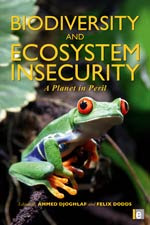Negotiation of Global Biodiversity Agreement will Resume at Special Three Day Meeting in Montreal, Dec. 3 - 5, Immediately Prior to COP15, Dec. 7 - 19
Media advisory from the CBD
Negotiation of Global Biodiversity Agreement will Resume at Special Three-Day Meeting in Montreal, Dec. 3 - 5, Immediately Prior to COP15, Dec. 7 - 19
5th session will tackle issues remaining on Global Biodiversity Framework to safeguard nature, scheduled for approval at COP15A special three-day meeting to advance an ambitious Global Biodiversity Framework agreement to bend the curve on nature loss will take place in Montreal 3-5 December.
It will be the world community's 5th meeting to negotiate the agreement's outline, goals and targets, which will be considered for adoption immediately thereafter during the 15th Conference of Parties to the UN Convention on Biological Diversity. COP15, chaired by China, now scheduled 7-19 Dec. in Montreal, Canada. A high-level segment of the conference will take place 13- 15 Dec.
Said Elizabeth Maruma Mrema, Executive Secretary of the Convention on Biological Diversity: “The 4th negotiating session in Nairobi in June was intended to be the last but the agreement is not yet there. While progress in Nairobi was slow, progress was made, including on the contentious issue of digital sequencing information for genetic resources. The parties will have to decide in December whether digital sequencing information will be part of the framework or dealt with separately. The additional negotiating days immediately before COP15 will be crucial to that question and more, necessitating a minor shift in the dates of this historic summit.”
Originally planned for Kunming, China in 2020, COP15 was postponed due to the COVID-19 pandemic and later split into a two-part event. Part 1 was successfully held in Kunming last October, at which Chinese President XI Jinping and other State leaders from eight Parties, as well as the UN Secretary General, made online presentations, reinforcing their commitment to addressing the biodiversity crisis.
COP15 part 1 was also highlighted by the Kunming Declaration and President Xi Jinping’s announcement that China would invest RMB 1.5 billion to establish the Kunming Biodiversity Fund, providing strong political impetus to global biodiversity governance and a solid foundation for the second part of COP 15.
The decision to relocate the conclusion of COP15 to Montreal was made last month by the Bureau of the Conference of the Parties, in consultation with the CBD Secretariat and the Governments of China and Canada.
Notes to editors
The upcoming UN Biodiversity Conference in Montreal is comprised of
• the 15th meeting of the Conference of the Parties to the Convention on Biological Diversity. https://www.cbd.int/meetings/COP-15
• the 10th meeting of the Conference of the Parties serving as the meeting of the Parties to the Cartagena Protocol on Biosafety (www.cbd.int/meetings; COPMOP-10) https://www.cbd.int/meetings/CP-MOP-10
• the 4th meeting of the Conference of the Parties serving as the meeting of the Parties to the Nagoya Protocol on Access and Benefit-sharing https://www.cbd.int/meetings/NP-MOP-04
Provisional agendas of the meetings are available at https://www.cbd.int/conferences/2021-2022. Other documentation will be made available as soon as possible, no later than six weeks prior to the meetings.
Registration: Media wishing to attend in person may register for the meetings beginning 15 August. Kindly advise tc@tca.tc if you plan to attend in person; a reminder and further instructions will be issued in mid-August.
Live streaming of the plenary, working groups and press events: https://www.cbd.int/live
Draft Post-2020 Global Biodiversity Framework: https://bit.ly/3RSpRJm
25 one-page information supplements to the first draft of the post-2020 global biodiversity framework: https://bit.ly/3v7S711
* * * * *
About the Convention on Biological Diversity (CBD)
Opened for signature in 1992 at the Earth Summit in Rio de Janeiro, and entering into force in December 1993, the CBD is an international treaty for the conservation of biodiversity, the sustainable use of the components of biodiversity and the equitable sharing of the benefits derived from the use of genetic resources.
With 196 Parties, the CBD has near universal participation among countries. The CBD seeks to address all threats to biodiversity and ecosystem services, including threats from climate change, through scientific assessments, the development of tools, incentives and processes, the transfer of technologies and good practices and the full and active involvement of relevant stakeholders including indigenous peoples and local communities, youth, women, NGOs, sub-national actors and the business community.
The Cartagena Protocol on Biosafety and the Nagoya Protocol on Access and Benefit-Sharing are supplementary agreements to the CBD. The Cartagena Protocol, which entered into force 11 September 2003, seeks to protect biodiversity from the potential risks posed by living modified organisms resulting from modern biotechnology.
To date, 173 Parties have ratified the Cartagena Protocol. The Nagoya Protocol aims at sharing the benefits arising from the utilization of genetic resources in a fair and equitable way, including by appropriate access to genetic resources and by appropriate transfer of relevant technologies. Entering into force 12 October 2014, it has been ratified by 135 Parties.
More information:
David Ainsworth, Information Officer, david.ainsworth@un.org Terry Collins, tc@tca.tc Franca D’Amico, franca.damico@un.org
Website: www.cbd.int Twitter: @UNBiodiversity Facebook: www.facebook.com/UNBiodiversityConvention LinkedIn: linkedin.com/company/unbiodiversity
 | ||
Biodiversity and Ecosystem Insecurity: A Planet in Peril 1st Edition
|




Comments
Post a Comment